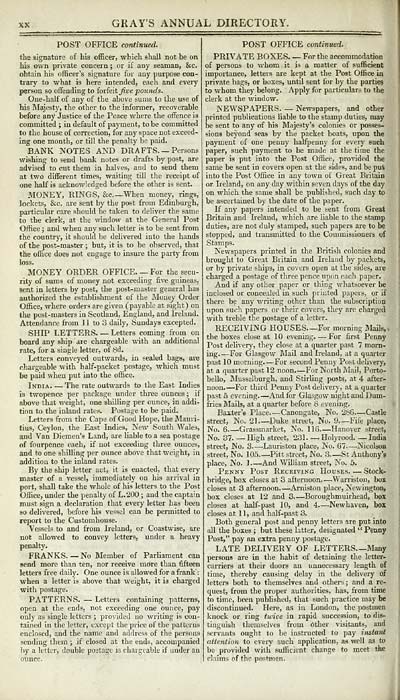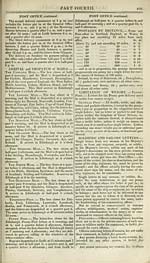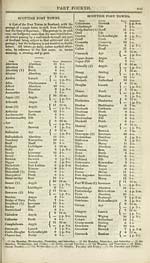Towns > Edinburgh > 1832-1838 - Gray's annual directory > 1833-1834
(506)
Download files
Complete book:
Individual page:
Thumbnail gallery: Grid view | List view

XX
GRAY'S ANNUAL DIRECTORY.
POST OFFICE continued.
the signature of his officer, which shall not be on
his own private concern ; or if any seaman, &c.
obtain his officer's signature for any purpose con-
trary to what is here intended, each and eveiy
person so offending to forfeit Jive pounds.
One-half of any of the above sums to the use of
his Majesty, the other to the informer, recoverable
before any Justice of the Peace where the offence is
committed ; in default of payment, to be committed
to the house of correction, for any space not exceed-
ing one month, or till the penalty be paid.
BANK NOTES AND DRAFTS. — Persons
wishing to send bank notes or drafts by post, are
advised to cut them in halves, and to send them
at two different times, waiting till the receipt of
one half is acknowledged before the other is sent.
MONEY, RINGS, &c— When money, rings,
lockets, &c. are sent by the post from Edinburgh,
particular care should be taken to deliver the same
to the clerk, at the window at the General Post
Office ; and when any such letter is to be sent from
the country, it should be delivered into the hands
of the post-master ; but, it is to be observed, that
the office does not engage to insure the party from
l0S9.
MONEY ORDER OFFICE. — For the secu-
rity of sums of money not exceeding five guineas,
sent in letters by post, the post-master general has
authorized the establishment of the Money Order
Office, where orders are given (payable at sight) on
the post-masters in Scotland, England, and Ireland.
Attendance from ] 1 to 3 daily, Sundays excepted.
SHIP LETTERS. — Letters coming from on
board any ship are chargeable with an additional
rate, for a single letter, of 8d.
Letters conveyed outwards, in sealed bags, are
chargeable with half-packet postage, which must
be paid when put into the office.
India The rate outwards to the East Indies
is twopence per package under three ounces ; if
above that weight, one shilling per ounce, in addi-
tion to the inland rates. Postage to be paid.
Letters from the Cape of Good Hope, the Mauri-
tius, Ceylon, the East Indies, New South Wales,
and Van Diemen's Land, are liable to a sea postage
of fourpence each, if not exceeding three ounces,
and to one shilling per ounce above that weight, in
addition to the inland rates.
By the ship letter act, it is enacted, that every
master of a vessel, immediately on his arrival in
port, shall take the whole of his letters to the Post
Office, under the penalty of L.200 ; and the captain
must sign a declaration that every letter has been
so delivered, before his vessel can be permitted to
report to the Customhouse.
Vessels to and from Ireland, or Coastwise, are
not allowed to convey letters, under a heavy
penalty.
FRANKS. —No Member of Parliament can
send more than ten, nor receive cadre than fifteen
letters free daily. One ounce is allowed for a frank':
when a letter is above that weight, it is charged
with postage.
PATTERNS. — Letters containing patterns,
open at the ends, not exceeding one ounce, pay
only as single letters ; provided no writing is con-
tained in the letter, except the price of the patterns
enclosed, and the name and address of the persons
sending them ; if closed at the ends, accompanied
by a letter, double postage is chargeable if under an
POST OFFICE continued.
PRIVATE BOXES. — For the accommodation
of persons to whom it is a matter of sufficient
importance, letters are kept at the Post Office in
private bags, or boxes, until sent for by the parties
to whom they belong. Apply for particulars to the
clerk at the window.
NEWSPAPERS. — Newspapers, and other
printed publications liable to the stamp duties, may
be sent to any of his Majesty's colonies or posses-
sions beyond seas by the packet boats, upon the
payment of one penny halfpenny for every such
paper, such payment to be made at the time the
paper is put into the Post Office, provided the
same be sent in covers open at the sides, and be put
into the Post Office in any town of Great Britain
or Ireland, on any day within seven days of the day
on which the same shall be published, such day to
be ascertained by the date of the paper.
If any papers intended to be sent from Great
Britain and Ireland, which are liable to the stamp
duties, are not duly stamped, such papers are to be
stopped, and transmitted to the Commissioners of
Stamps.
Newspapers printed in the British colonies and
brought to Great Britain and Ireland by packets,
or by private ships, in covers open at the sides, are
charged a postage of three pence upon each paper.
And if any other paper or thing whatsoever be
inclosed or concealed in such printed papers, or if
there be any writing other than the subscription
upon such papers or their covers, they are charged
with treble the postage of a letter.
RECEIVING HOUSES — For morning Mails,.
the boxes close at 10 evening For first Penny
Post delivery, they close at a quarter past 7 morn-
ing. — For Glasgow Mail and Ireland, at a quarter
past 10 morning. — For second Penny Post delivery,
at a quarter past 12 noon. — For North Mail, Porto-
bello, Musselburgh, and Stirling posts, at 4 after-
noon. — For third Penny Post delivery, at a quarter
past 5 evening. — And for Glasgow night and Dum-
fries Mails, at a quarter before 8 evening.
Baxter's Place Canongate, No. 286. — Castle
street, No. 21. — Duke street, No. 9. — Fife place,
No. 6 .Grassmarket, No. 116. — Hanover street,
No. 37 High street, 231 . Holyrood India
street, No. 3. — Lauriston place, No. 67 — Nicolson
street, No. 105 Pitt street, No. 3. — St Anthony's
place, No. 1. — And William street, No. 5.
Penny Post Receiving Houses. — Stock-
bridge, box closes at 3 afternoon.— Warriston, box
closes at 3 afternoon. — Arniston place, Newington,
box closes at 12 and 3. — Boroughmuirhead, box
closes at half-past 10, and 4 — Newhaven, box
closes at 11, and half-past 3.
Both general post and penny letters are put into
all the boxes ; but these latter, designated " Penny
Post," pay an extra penny postage.
LATE DELIVERY OF LETTERS — Many
persons are in the habit of detaining the letter-
carriers at their doors an unnecessary length of
time, thereby causing delay in the delivery of
letters both to themselves and others ; and a re-
quest, from the proper authorities, has, from time
to time, been published, that such practice may be
discontinued. Here, as in London, the postmen
knock or ring twice in rapid succession, to dis-
tinguish themselves from other visitants, and
servants ought to be instructed to pay instant
attention to every such application, as well as to
be provided with sufficient change to meet the
claims of the postmen.
GRAY'S ANNUAL DIRECTORY.
POST OFFICE continued.
the signature of his officer, which shall not be on
his own private concern ; or if any seaman, &c.
obtain his officer's signature for any purpose con-
trary to what is here intended, each and eveiy
person so offending to forfeit Jive pounds.
One-half of any of the above sums to the use of
his Majesty, the other to the informer, recoverable
before any Justice of the Peace where the offence is
committed ; in default of payment, to be committed
to the house of correction, for any space not exceed-
ing one month, or till the penalty be paid.
BANK NOTES AND DRAFTS. — Persons
wishing to send bank notes or drafts by post, are
advised to cut them in halves, and to send them
at two different times, waiting till the receipt of
one half is acknowledged before the other is sent.
MONEY, RINGS, &c— When money, rings,
lockets, &c. are sent by the post from Edinburgh,
particular care should be taken to deliver the same
to the clerk, at the window at the General Post
Office ; and when any such letter is to be sent from
the country, it should be delivered into the hands
of the post-master ; but, it is to be observed, that
the office does not engage to insure the party from
l0S9.
MONEY ORDER OFFICE. — For the secu-
rity of sums of money not exceeding five guineas,
sent in letters by post, the post-master general has
authorized the establishment of the Money Order
Office, where orders are given (payable at sight) on
the post-masters in Scotland, England, and Ireland.
Attendance from ] 1 to 3 daily, Sundays excepted.
SHIP LETTERS. — Letters coming from on
board any ship are chargeable with an additional
rate, for a single letter, of 8d.
Letters conveyed outwards, in sealed bags, are
chargeable with half-packet postage, which must
be paid when put into the office.
India The rate outwards to the East Indies
is twopence per package under three ounces ; if
above that weight, one shilling per ounce, in addi-
tion to the inland rates. Postage to be paid.
Letters from the Cape of Good Hope, the Mauri-
tius, Ceylon, the East Indies, New South Wales,
and Van Diemen's Land, are liable to a sea postage
of fourpence each, if not exceeding three ounces,
and to one shilling per ounce above that weight, in
addition to the inland rates.
By the ship letter act, it is enacted, that every
master of a vessel, immediately on his arrival in
port, shall take the whole of his letters to the Post
Office, under the penalty of L.200 ; and the captain
must sign a declaration that every letter has been
so delivered, before his vessel can be permitted to
report to the Customhouse.
Vessels to and from Ireland, or Coastwise, are
not allowed to convey letters, under a heavy
penalty.
FRANKS. —No Member of Parliament can
send more than ten, nor receive cadre than fifteen
letters free daily. One ounce is allowed for a frank':
when a letter is above that weight, it is charged
with postage.
PATTERNS. — Letters containing patterns,
open at the ends, not exceeding one ounce, pay
only as single letters ; provided no writing is con-
tained in the letter, except the price of the patterns
enclosed, and the name and address of the persons
sending them ; if closed at the ends, accompanied
by a letter, double postage is chargeable if under an
POST OFFICE continued.
PRIVATE BOXES. — For the accommodation
of persons to whom it is a matter of sufficient
importance, letters are kept at the Post Office in
private bags, or boxes, until sent for by the parties
to whom they belong. Apply for particulars to the
clerk at the window.
NEWSPAPERS. — Newspapers, and other
printed publications liable to the stamp duties, may
be sent to any of his Majesty's colonies or posses-
sions beyond seas by the packet boats, upon the
payment of one penny halfpenny for every such
paper, such payment to be made at the time the
paper is put into the Post Office, provided the
same be sent in covers open at the sides, and be put
into the Post Office in any town of Great Britain
or Ireland, on any day within seven days of the day
on which the same shall be published, such day to
be ascertained by the date of the paper.
If any papers intended to be sent from Great
Britain and Ireland, which are liable to the stamp
duties, are not duly stamped, such papers are to be
stopped, and transmitted to the Commissioners of
Stamps.
Newspapers printed in the British colonies and
brought to Great Britain and Ireland by packets,
or by private ships, in covers open at the sides, are
charged a postage of three pence upon each paper.
And if any other paper or thing whatsoever be
inclosed or concealed in such printed papers, or if
there be any writing other than the subscription
upon such papers or their covers, they are charged
with treble the postage of a letter.
RECEIVING HOUSES — For morning Mails,.
the boxes close at 10 evening For first Penny
Post delivery, they close at a quarter past 7 morn-
ing. — For Glasgow Mail and Ireland, at a quarter
past 10 morning. — For second Penny Post delivery,
at a quarter past 12 noon. — For North Mail, Porto-
bello, Musselburgh, and Stirling posts, at 4 after-
noon. — For third Penny Post delivery, at a quarter
past 5 evening. — And for Glasgow night and Dum-
fries Mails, at a quarter before 8 evening.
Baxter's Place Canongate, No. 286. — Castle
street, No. 21. — Duke street, No. 9. — Fife place,
No. 6 .Grassmarket, No. 116. — Hanover street,
No. 37 High street, 231 . Holyrood India
street, No. 3. — Lauriston place, No. 67 — Nicolson
street, No. 105 Pitt street, No. 3. — St Anthony's
place, No. 1. — And William street, No. 5.
Penny Post Receiving Houses. — Stock-
bridge, box closes at 3 afternoon.— Warriston, box
closes at 3 afternoon. — Arniston place, Newington,
box closes at 12 and 3. — Boroughmuirhead, box
closes at half-past 10, and 4 — Newhaven, box
closes at 11, and half-past 3.
Both general post and penny letters are put into
all the boxes ; but these latter, designated " Penny
Post," pay an extra penny postage.
LATE DELIVERY OF LETTERS — Many
persons are in the habit of detaining the letter-
carriers at their doors an unnecessary length of
time, thereby causing delay in the delivery of
letters both to themselves and others ; and a re-
quest, from the proper authorities, has, from time
to time, been published, that such practice may be
discontinued. Here, as in London, the postmen
knock or ring twice in rapid succession, to dis-
tinguish themselves from other visitants, and
servants ought to be instructed to pay instant
attention to every such application, as well as to
be provided with sufficient change to meet the
claims of the postmen.
Set display mode to: Large image | Transcription
Images and transcriptions on this page, including medium image downloads, may be used under the Creative Commons Attribution 4.0 International Licence unless otherwise stated. ![]()
| Scottish Post Office Directories > Towns > Edinburgh > Gray's annual directory > 1833-1834 > (506) |
|---|
| Permanent URL | https://digital.nls.uk/87893334 |
|---|
| Description | Edinburgh : J. Gray, 1832-1837. |
|---|---|
| Shelfmark | Various |
| Description | Directories of individual Scottish towns and their suburbs. |
|---|
| Description | Around 700 Scottish directories published annually by the Post Office or private publishers between 1773 and 1911. Most of Scotland covered, with a focus on Edinburgh, Glasgow, Dundee and Aberdeen. Most volumes include a general directory (A-Z by surname), street directory (A-Z by street) and trade directory (A-Z by trade). |
|---|


